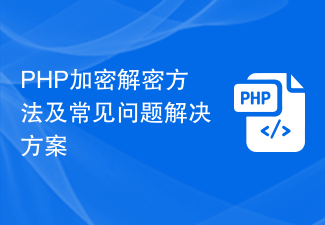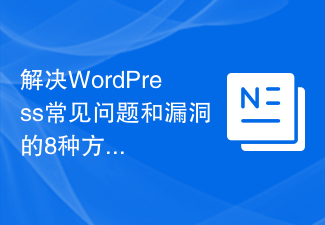
PHP Linux Script Debugging Tips: Ways to Solve Common Problems, Specific Code Examples Required
Introduction:
When developing and maintaining PHP scripts, We often encounter various problems. Debugging is one of the key steps in resolving these issues. This article will introduce some common problems and solutions for debugging PHP scripts in a Linux environment, and provide specific code examples.
1. Use echo and var_dump to output variable values
When debugging PHP scripts, we often need to check the values of variables to determine whether the execution of the code is as expected. You can use the echo and var_dump functions to output variable values.
For example:
$name = 'John';
echo $name; // 输出:John
$array = [1, 2, 3];
var_dump($array); // 输出:array(3) { [0]=> int(1) [1]=> int(2) [2]=> int(3) }2. Use error_reporting and ini_set to turn on error reporting
When an error occurs in a PHP script, the specific error message will not be displayed by default. To facilitate debugging, we can use the error_reporting and ini_set functions to turn on error reporting and display all error information.
For example:
error_reporting(E_ALL);
ini_set('display_errors', '1');3. Use try-catch block to catch exceptions
In the development process, we often need to handle possible exceptions, use try-catch block These exceptions can be caught and handled.
For example:
try {
// 可能引发异常的代码
} catch (Exception $e) {
// 处理异常的代码
}4. Use the xdebug extension for advanced debugging
xdebug is a powerful PHP debugging tool that provides many useful functions, such as breakpoints Settings, code coverage, variable tracking, and more. The following are the steps and sample code to install and configure xdebug in a Linux environment:
- Install the xdebug extension:
Run the following command in the Linux terminal:
pecl install xdebug
- Configure the PHP.ini file:
Open the php.ini file and add the following configuration at the end of the file:
[XDebug] zend_extension=xdebug.so xdebug.remote_enable=1 xdebug.remote_autostart=1
- Restart the Web server:
Restart the web server to make the configuration take effect.
- Set a breakpoint:
Add a breakpoint before the line of code that needs to be debugged:
$x = 1; $y = 2; $sum = $x + $y; // 设置断点 echo $sum;
- Start the debugging process:
Access the page that needs to be debugged in the browser, xdebug will automatically establish a connection with the debugger (such as Eclipse or PhpStorm).
- Execution steps:
In the debugger, you can execute the code line by line and view the values of variables, return status of functions, etc.
5. Use log files for debugging
When the debugger cannot be used for debugging, we can output the debugging information to the log file for analysis and viewing.
For example:
$logFile = '/path/to/log.txt'; $name = 'John'; file_put_contents($logFile, $name . " ", FILE_APPEND);
6. Use developer tools for network debugging
When you need to debug network-related issues, you can use developer tools for network debugging. By viewing the details of the request and response, we can quickly locate the problem.
Conclusion:
This article introduces some common techniques and methods for debugging PHP scripts in a Linux environment. By using echo and var_dump to output variable values, turning on error reporting, catching exceptions, using xdebug extensions, using log files and developer tools for network debugging, we can analyze and solve problems more conveniently. I hope these tips will be helpful to you in your debugging work in PHP development.
The above is the detailed content of PHP Linux Script Debugging Tips: Ways to Solve Common Problems. For more information, please follow other related articles on the PHP Chinese website!
 在 Windows 上运行 shell 脚本文件的不同方法Apr 13, 2023 am 11:58 AM
在 Windows 上运行 shell 脚本文件的不同方法Apr 13, 2023 am 11:58 AM适用于 Linux 的 Windows 子系统第一种选择是使用适用于 Linux 或 WSL 的 Windows 子系统,这是一个兼容层,用于在 Windows 系统上本地运行 Linux 二进制可执行文件。它适用于大多数场景,允许您在 Windows 11/10 中运行 shell 脚本。WSL 不会自动可用,因此您必须通过 Windows 设备的开发人员设置启用它。您可以通过转到设置 > 更新和安全 > 对于开发人员来完成。切换到开发人员模式并通过选择是确认提示。接下来,查找 W
 如何使用Python在Linux中进行脚本编写和执行Oct 05, 2023 am 11:45 AM
如何使用Python在Linux中进行脚本编写和执行Oct 05, 2023 am 11:45 AM如何使用Python在Linux中进行脚本编写和执行在Linux操作系统中,我们可以使用Python编写并执行各种脚本。Python是一种简洁而强大的编程语言,它提供了丰富的库和工具,使得脚本编写变得更加简单和高效。下面我们将介绍在Linux中如何使用Python进行脚本编写和执行的基本步骤,同时提供一些具体的代码示例来帮助你更好地理解和运用。安装Pytho
 PHP加密解密方法及常见问题解决方案Jun 09, 2023 pm 01:50 PM
PHP加密解密方法及常见问题解决方案Jun 09, 2023 pm 01:50 PMPHP是一种流行的服务器端编程语言,广泛用于Web应用程序开发中。在实际应用中,PHP加密解密是非常常见的操作。本文将介绍PHP中常见的加密解密方法,以及常见问题的解决方案。一、加密方法1.对称加密法(SymmetricCryptography)对称加密法是加密技术中应用最广泛的一种方法。该方法使用相同的密钥对数据进行加密和解密。在PHP中,常用的对称加密
 PHP开发的10个调试技巧May 24, 2023 am 08:23 AM
PHP开发的10个调试技巧May 24, 2023 am 08:23 AM在PHP开发过程中,调试是不可避免的一个过程。但是有些开发者在遇到问题时,往往会采用非常低效的方法进行调试,比如打断点、输出调试信息等。这些方法并不一定能够有效地解决问题,同时还会损失很多时间和精力。为此,本文将介绍PHP开发中10个高效的调试技巧,相信这些技巧能够帮助PHP开发者更快更准确地解决问题。使用xdebugxdebug是PHP调试过程中的一款强大
 解决WordPress常见问题和漏洞的8种方法Sep 04, 2023 pm 04:41 PM
解决WordPress常见问题和漏洞的8种方法Sep 04, 2023 pm 04:41 PM创建十九年后,WordPress仍然是万维网上最受欢迎和使用最广泛的内容管理系统(CMS)之一。从数字上看,超过60%的互联网网站都是基于WordPress构建的!这种受欢迎程度带来了很多优势,例如大型开发者社区、广泛的工具以及大量的教程和指南。但它也有一些缺点。其中之一是对黑客攻击的敏感性增加。黑客喜欢攻击WordPress。事实上,在所有被黑客攻击的基于CMS的网站中,83%都是基于WordPress构建的。他们喜欢寻找漏洞来利用,不幸的是,WordPress有一些这样的漏洞。在本文中,我将
 PHP调试技巧:如何使用xdebug插件进行代码调试和断点设置Aug 01, 2023 pm 07:57 PM
PHP调试技巧:如何使用xdebug插件进行代码调试和断点设置Aug 01, 2023 pm 07:57 PMPHP调试技巧:如何使用xdebug插件进行代码调试和断点设置引言:在开发PHP应用程序时,调试是一个非常重要的环节。调试能够帮助我们快速找到代码中的错误并进行修复,提高开发效率。而xdebug是PHP开发者常用的调试插件之一,它提供了强大的调试功能,本文将介绍如何使用xdebug插件进行代码调试和断点设置。一、安装和配置xdebug插件要使用xdebug插
 PHP会话管理方法及常见问题解决方案Jun 08, 2023 pm 01:52 PM
PHP会话管理方法及常见问题解决方案Jun 08, 2023 pm 01:52 PMPHP是一种广泛使用的开源脚本语言,它被用于构建动态的网站和Web应用程序。在开发Web应用程序时,会话管理是一个非常重要的方面,因为它允许开发者在不同请求之间存储和维护用户信息。本文将详细介绍PHP中的会话管理方法以及常见问题解决方案。会话管理方法PHP提供了几种会话管理方法,包括使用Cookie、使用GET或POST变量以及使用会话变量。下面是一些常用的
 在PHP中调试无法定位错误代码的问题May 11, 2023 pm 07:01 PM
在PHP中调试无法定位错误代码的问题May 11, 2023 pm 07:01 PMPHP作为一种开源、通用的脚本语言,广泛应用于Web开发领域。在日常的开发工作中,我们难免会遇到无法定位错误代码的问题。本文将介绍在PHP中调试无法定位错误代码的问题,并提供一些实用的调试技巧和工具。一、代码审查在遇到代码问题时,先检查代码是否有语法或逻辑错误。PHP提供了error_reporting和display_errors指令来捕获和显示错误信息。


Hot AI Tools

Undresser.AI Undress
AI-powered app for creating realistic nude photos

AI Clothes Remover
Online AI tool for removing clothes from photos.

Undress AI Tool
Undress images for free

Clothoff.io
AI clothes remover

AI Hentai Generator
Generate AI Hentai for free.

Hot Article

Hot Tools

MantisBT
Mantis is an easy-to-deploy web-based defect tracking tool designed to aid in product defect tracking. It requires PHP, MySQL and a web server. Check out our demo and hosting services.

Atom editor mac version download
The most popular open source editor

Dreamweaver Mac version
Visual web development tools

Notepad++7.3.1
Easy-to-use and free code editor

SublimeText3 English version
Recommended: Win version, supports code prompts!






